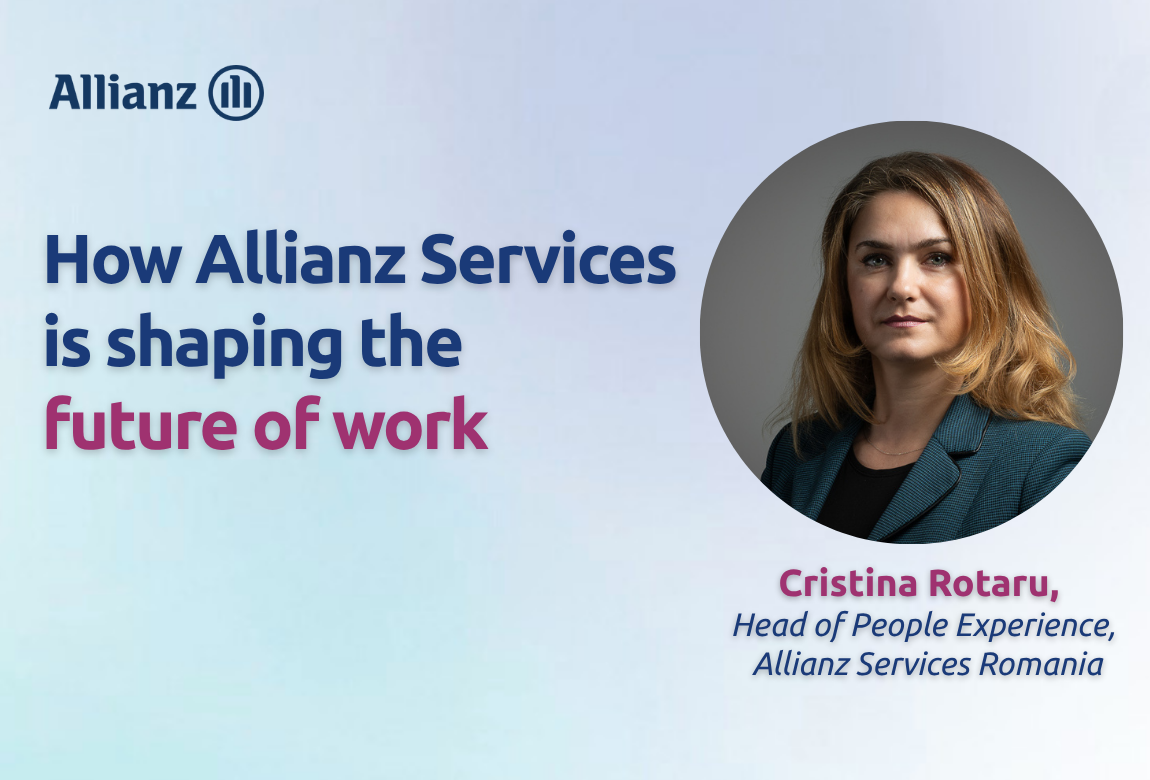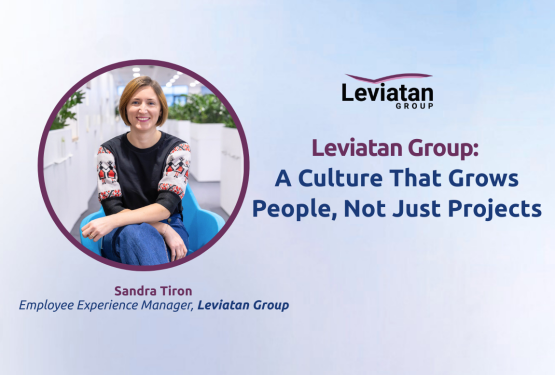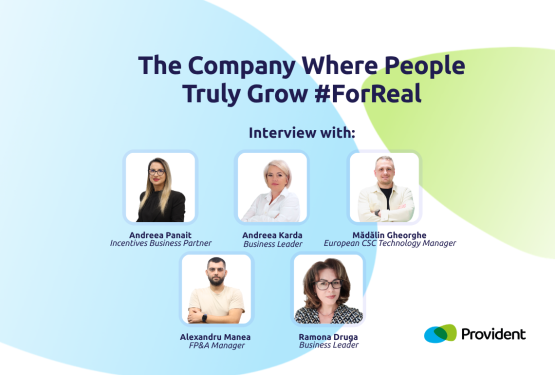Share
How Allianz Services is shaping the future of work

We continue our series of interviews with employers who place people at the heart of their organizational culture and actively contribute to building a more transparent labor market in Romania.
Today we speak with Cristina Rotaru, Head of People Experience at Allianz Services Romania, part of Allianz Group, one of the world’s largest insurers and asset managers. With a team of over 1,400 professionals in Romania and recognized for four consecutive years as a Great Place to Work, the company consistently invests in creating a safe, inclusive, and growth-oriented environment.
In this interview, Cristina shares her perspective on what psychological safety means in the workplace, how it has become a strategic priority for Allianz Services, and why it is essential for innovation and sustainable performance.
1. To start on a personal note, what does psychological safety mean to you, and why do you believe it matters in today’s workplace?
I truly believe that bringing your whole self to work helps everyone thrive. To me, psychological safety means creating a space where we feel safe to speak up, whether it is asking questions, admitting mistakes, or challenging ideas, without fear of judgment. It is about fostering authenticity, trust, and inclusion, which are core values at Allianz Services.
In today’s fast-paced work environment, psychological safety is essential for adapting, innovating, and collaborating. Early in my career, I was part of a team that was navigating a particularly challenging project. The atmosphere in my team was tense, so I hesitated to voice my concerns, fearing it might be perceived as incompetence. When a colleague opened up about their struggles and encouraged us to do the same, it completely changed the dynamic. We worked through challenges together, and the project succeeded. That moment showed me how powerful psychological safety is for personal growth and team success.
At Allianz Services Romania, psychological safety is not just something nice to have. I believe it is essential for our collective progress and well-being.
2. How would you describe Allianz Services Romania’s journey toward building a psychologically safe culture?
I think it is best to start from the beginning and explain why we launched this program. Over the years, we have introduced many initiatives to support the well-being of our colleagues and strengthen collaboration. These efforts led to high internal engagement scores and strong participation in our well-being programs. So, we asked ourselves what more we could do.
And the answer was already there: innovation. At Allianz Services Romania, we already knew that continuous improvement and innovation are key to the shared success of our people and Allianz customers. At the same time, innovation requires strong collaboration, and that thrives in psychologically safe environments. With our belief in leading by example, we launched a pilot program with our local management team, which set the tone for the entire organization.
The culture we are trying to build is based on empowering our colleagues to speak up, challenge ideas, and admit mistakes without fear, which ultimately leads to unlocking their full potential, driving business success, and building resilience.
Spearheaded by six certified internal experts from our People Experience Team, this program is a testament to our commitment to employee well-being and organizational excellence.
3. What led Allianz Services Romania to make psychological safety a strategic priority, and why is now the right time to focus on it?
A mix of milestones, challenges, and intentions aligned with our commitment to fostering a truly thriving workplace. In the wake of post-pandemic shifts, with hybrid work models on the rise and well-being in sharper focus, we recognized the right opportunity to invest more in cultivating an environment where people feel secure, supported, and empowered.
The Allianz Services Romania culture naturally aligned with the essential principles of psychological safety, representing not only a strategic priority but also a foundational element of our journey toward excellence. We recognize that a culture of trust and respect enhances both individual and collective success and supports long-term sustainability. This commitment is deeply connected to Allianz’s core values and underscores our dedication to supporting our people’s growth and well-being.
I believe that investing in our team’s psychological safety is an investment in our future as a business, making sure that Allianz Services Romania and its people remain resilient, adaptable, and innovative in the face of evolving challenges.
4. You are one of the six members of the Allianz Services Romania People Experience team accredited by the Fearless Organization Scan. What inspired you to take this step, and how does it translate into practice within the company?
Becoming accredited by the Fearless Organization Scan, a research-based, action-oriented tool developed from Harvard Professor Amy C. Edmondson’s pioneering work to measure and improve psychological safety, was a pivotal step for me and my colleagues. This accreditation was important because it allowed us to equip ourselves with the skills needed to foster a psychologically safe environment within Allianz Services Romania and contribute with our expertise to our growth.
The Fearless Organization Scan model deeply resonated with me, mainly because of its emphasis on creating spaces where individuals feel safe to express themselves, innovate, and collaborate without fear. Our team was carefully selected for accreditation based on our strengths, our commitment to people’s well-being, and our ability to drive meaningful change within the organization. Each of us brings unique contributions and perspectives, making us well-suited to champion this initiative.
It is safe to say that this model has profoundly shaped our approach. We conduct team workshops, leadership coaching, listening sessions, and assessments to ensure that psychological safety is not just a concept but a lived experience for our colleagues. These activities are designed to empower teams, enhance communication, and build a culture of trust and respect.
5. Where does psychological safety begin in an organization, and who is responsible for making it happen?
For me, it begins with leadership, but it truly flourishes when everyone takes ownership. While Human Resources teams can play a crucial role in enabling and supporting this environment, it is a myth that psychological safety solely relies on them. In reality, it is a collective effort that requires active participation from all members of the organization.
Leadership sets the tone by modeling behaviors that promote trust, openness, and respect. However, culture is shaped by the actions and interactions of colleagues at every level. Each team member contributes to creating a safe environment by engaging in honest communication, showing empathy, and supporting one another.
Safe environments are co-created, and it is through collaboration and shared commitment that psychological safety becomes a reality. When everyone embraces their role in fostering this culture, we build a foundation where innovation thrives, collaboration is seamless, well-being is prioritized, and everyone can reach their true potential.
6. Can psychological safety be learned, and what skills are most important for leaders and teams to develop it?
Definitely, it can be learned and cultivated. Leaders and teams can develop it by focusing on open communication, vulnerability, transparency, constructive feedback, empathy, active listening, and self-awareness, which are key skills for cultivating a psychologically safe environment. They have the power to build trust and openness, enhance decision-making, and allow teams to challenge the status quo.
At Allianz Services Romania, we understand the importance of our people’s safety, so we foster open channels for communication that allow colleagues to share ideas without fear of judgment, which in turn leads to better decision-making and continuous improvement.
Talking, reading, studying, or simply listening to conversations about psychological safety is essential for us to better understand how to create it.
7. How do you support your teams in building psychological safety in their day-to-day interactions, especially in moments of uncertainty or pressure?
It is true that moments of uncertainty or pressure can challenge psychological safety. Support can often be as simple as shifting your perception and learning that mistakes are simply stepping stones to growth. Through our culture of openness and mutual support, we encourage everyone to reach out for help when they need it.
In addition to the psychological safety sessions guided by our certified assessors, at Allianz Services Romania we offer a variety of trainings, programs, and workshops that empower our teams to take initiative and build confidence in their daily interactions. These resources are designed to equip our colleagues with the skills to handle uncertainty and pressure with resilience and creativity. Our commitment is to ensure they always feel supported and valued, celebrating successes and learning from every experience.
8. How does psychological safety influence performance, innovation, or retention at Allianz Services Romania, and how do you measure it?
When team members feel safe, they are more likely to take creative risks, speak up early, and solve problems efficiently. At Allianz Services Romania, this type of environment has led to a noticeable increase in cross-functional collaboration and sparked numerous innovative ideas among colleagues. According to our internal surveys, specifically designed to understand our colleagues’ perceptions of their work environment, this has led to a 7 percent increase in engagement scores compared to the previous year, alongside improved employee retention and a 3 percent decrease in turnover, reflecting greater stability and loyalty within the team.
We have seen tangible results through initiatives like Allianz Services Romania InnovateX Center, our innovation hub, where teams come together to brainstorm and develop solutions. Our hackathons have also been a testament to the power of psychological safety, fostering a space where creativity thrives and diverse perspectives are celebrated. These efforts have boosted performance and contributed to higher retention rates, with people feeling valued and motivated to grow with us.
Feedback mechanisms play a crucial role in measuring the impact of psychological safety. We organize regular feedback sessions that allow employees to share their thoughts and concerns, offering valuable insights into the psychological safety climate. Guided by our certified experts, these structured sessions foster honest, open communication, ensuring everyone feels heard and valued.
9. From your experience, what are some of the most common misconceptions about psychological safety?
Maybe the most prominent misunderstanding is that it means being nice, when in fact it is about encouraging open communication and giving helpful feedback. A key approach we use is called radical candor, a concept popularized by Kim Scott in her book Radical Candor: Be a Kick-Ass Boss Without Losing Your Humanity. This method emphasizes giving feedback that is both direct and caring. Another myth is that it lowers standards. In truth, it helps raise standards by creating a safe space where team members can challenge ideas and innovate without fear.
I believe it is important to understand that psychological safety is not just about feeling safe, it involves active engagement, trust, and having the freedom to speak up and take risks, and it can be cultivated in time through intentional actions. Psychological safety does not eliminate conflict, instead it allows diverse opinions to be expressed and resolved constructively.
10. As Allianz Services Romania continues to operate in a hybrid work environment, how do you foster psychological safety when in-person connection can feel limited?
At Allianz Services Romania we prioritize creating a supportive and inclusive environment where everyone feels heard and appreciated. We encourage open conversations with regular virtual check-ins to keep us all connected, supporting individual mental health and nurturing a culture rooted in empathy and understanding.
We provide our people with comprehensive mental health and well-being support through our Employee Assistance Program (EAP), offering free, access to professional psychological counseling. Over the past year, 56 percent of our colleagues have used these confidential services. Additionally, 62 percent of our managers are certified as Mental Health First Aiders, serving as trusted points of contact who can recognize signs of distress and guide employees to the right resources.
Throughout the year, we host interactive live webinars and in-person workshops led by qualified external therapists and specialists, which equip colleagues with practical tools to manage mental health, stress, burnout, and work-life balance, with 55 percent of them participating in at least one well-being initiative in the last year.
No matter where our colleagues work from, they always feel supported.
11. For organizations just beginning this journey, what is one practical step they can take from our conversation to start building a more psychologically safe culture?
Building a culture of psychological safety takes ongoing effort and everyone’s involvement, not just HR or leadership. Of course, having solid programs like the one we have at Allianz Services Romania with proven methods and resources makes a huge difference, but practically speaking, a great first step anyone can take is asking a simple yet powerful question: “What is one thing I could do to make this space feel safer?”
This is the kind of question that invites everyone to think about how they can help create a safer environment. It encourages small, practical actions that, when added up, can really change workplace culture. Small habits, like regularly checking in with colleagues, active listening, and acknowledging diverse perspectives, can slowly build a strong foundation of trust and openness. When these habits become part of everyday interactions, they help shape a culture where psychological safety is valued and nurtured.
Do you want to be part of an organization where trust, collaboration, and people development are true priorities? Visit the Allianz Services Romania company page and discover all the available career opportunities.
Share
What I read is worth it:
Read all the articles about
Undelucram interviews Leadership skills Workforce planning Organizational excellence Employee experienceArticle written by:
Comments
0 comments

Access your account and add your comment
Undelucram interviews
Subscribe to the Newsletter
Read articles of interest from Undelucram.ro contributors



